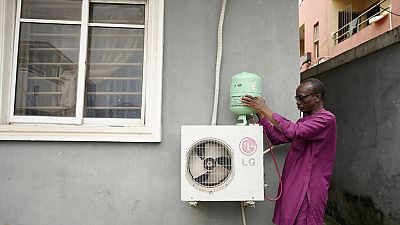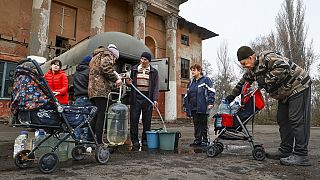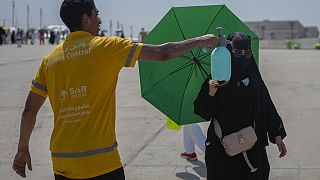Nigeria
As the sun beats down in Abuja, Nigeria’s capital, Ahmed Bukar turns on his home’s air conditioner and gets a blast of warm air. The charging valve on the outdoor unit is leaking the refrigerant gas that powers the unit. A technician recently helped him fill the air conditioner with gas, but he didn’t check for leaks.
In Abuja and across Nigeria , air conditioners are coming out of the walls as the appliance, once a luxury for the middle class, has become a necessity in an increasingly hot climate.
The sector is governed by regulations that prohibit the release of refrigerant gases into the air, such as by conducting leak tests after repairing an appliance.
Yet the systematic release of gases into the atmosphere due to faulty installations, unsafe disposal at the end of use, or adding gas without leak testing is a common problem in Nigeria, even though it is illegal.
Gases known as refrigerants that power cooling systems have a warming potential hundreds or even thousands of times greater than carbon dioxide, and the worst of them also damage the ozone layer.
Following global agreements that promised to limit emissions of these gases into the atmosphere, such as the Montreal Protocol and the Kigali Amendments , Nigeria has adopted regulations governing the use of these gases. But enforcement of these regulations is problematic and threatens Nigeria's commitments to reduce emissions.
Lack of training
"These laws, these rules, nobody is enforcing them ," said Abiodun Ajeigbe, head of Samsung's air conditioning division in West Africa. "I have not seen any enforcement of the law."
According to Mr. Ajeigbe, the weak regulatory system for the refrigeration industry in Nigeria is reflected in a glaring lack of training and awareness among technicians on the adverse effects of refrigerants on the environment. And this is often visible.
After uninstalling an air conditioner for a customer who was moving to another area, Cyprian Braimoh, a technician in Karu district of Abuja, carelessly dumped the gas from the unit into the air, preparing it to be recharged with fresh gas at the customer's new location.
If he had followed the country’s regulations, he would have collected the gas in a canister, which would have prevented or minimized the gas’s harmful effects on the environment. Technicians like Braimoh and those who serviced Bukar’s device without checking for leaks are independent contractors who are not supervised. But they often get clients because they offer cheaper services.
“I wasn’t taught it; I just blow it into the air ,” said Braimoh, who first specialized in electrical wiring for buildings before moving into repairing air conditioners to increase his income opportunities. He received uneven training that did not include the safety standards required for handling refrigerants. He also still has not conducted a leak test after installing the air conditioning in his client’s new premises, as required by national regulations for the refrigeration industry.
Installations carried out by well-trained technicians who comply with environmental regulations can be more expensive for customers. This is often the case in Nigeria, where using the services of companies like Daibau, which later helped Bukar fix his leaks, can result in higher costs.
Manufacturers that offer direct refrigeration and air conditioning installation services to large commercial customers have tried to self-regulate by providing safety training and certification to their technicians, Ajeigbe said.
Powerful greenhouse gases
According to industry insiders and public records, the most common air conditioners in Africa still use R-22 gas. This refrigerant is less harmful to the ozone layer than older, more harmful refrigerants called chlorofluorocarbons (CFCs). CFCs were largely phased out under the 1987 Montreal Protocol , which was created to protect the ozone layer, the atmosphere’s vital shield against cancer-causing ultraviolet rays.
But R-22 is 1,810 times more harmful to the climate than carbon dioxide, according to the U.S. Environmental Protection Agency. A single pound of the refrigerant is nearly as potent as a ton of carbon dioxide, the most common greenhouse gas, but while CO2 can stay in the atmosphere for more than 200 years, R-22 only lasts about 12 years. R-22 air conditioners are also inefficient, and most of the electricity that powers them in Africa comes from fossil fuels.
Nigeria plans to phase out R-22 refrigerant by January 1, 2030. However, due to lax enforcement of regulations, it is not certain that this target will be achieved, Ajeigbe said.
Newer air conditioners that use a family of gases called hydrofluorocarbons (HFCs) don't harm the ozone and use less electricity. But HFCs remain powerful greenhouse gases and are responsible for about 2 percent of all human-caused warming of the atmosphere.
An HFC, R-410A, which is still a common refrigerant in Europe and the United States, has a global warming potential 2,088 times that of carbon dioxide and lasts about 30 years in the atmosphere. Air conditioners running on this refrigerant are most common in Africa.
Another HFC, R-32, is 675 times more potent than CO2, lasts about five years in the atmosphere and is more energy efficient. But it is only “marginally” present in the African market, Ajeigbe said.
HFC-powered air conditioners are more expensive, meaning they are less popular than more polluting air conditioners, according to salespeople and technicians in Abuja and Lagos.
A larger problem
Nigeria is not alone. In Ghana , the refrigeration industry is also struggling to convince technicians to comply with environmental standards .
According to the Environmental Protection Agency, the country's "prevalent poor maintenance practices" are largely driven by consumers, who choose poorly trained technicians for cost reasons and ignore recommended standards.
In Kenya , demand for cooling systems is increasing as temperatures warm , the population grows and access to electricity expands. Air conditioners that run on R-22 are still very common in Kenya, but the National Environmental Management Authority told The Associated Press that there have been no new imports since 2021, in line with 2020 regulations.
Regulations require technicians who work with refrigerants and cooling equipment to be licensed, but these are not enforced, technicians told AP, allowing environmentally hazardous practices to take place.
“You just need to be well trained and start the installations, it is a very simple industry for us who earn our living from it ,” said Jeremiah Musyoka, a Nairobi-based technician.
R-290, an energy-efficient and less harmful refrigerant gas, is gradually becoming an alternative for refrigeration and air conditioning in developed markets such as the EU. Demand for efficient heat pumps is growing rapidly in the EU, but adoption in Africa remains insignificant due to cost barriers and limited awareness.
Countries like Nigeria, Ghana and Kenya have also identified R-290 as a potential replacement for HFCs, but models using it are not commercially available. In addition, they still have to worry about specialized training of technicians due to R-290's high flammability.
"I am concerned about the lack of training and the lack of enforcement of existing regulations ," said Mr Ajeigbe, a Samsung executive. However, he believes that enforcing the ban on the importation of banned gases and devices that use them would make a difference.
Anastasia Akhigbe, a senior regulatory officer at the Nigerian National Environmental Standards and Regulations Agency, added that it would also be helpful to increase awareness among appliance importers, technicians and consumers about the impact of some refrigerants on the environment.
“Enforcement of the legislation is a known challenge, but we are making progress ,” Ms. Akhigbe said.














Go to video
Major nations agree on first global tax on shipping’s greenhouse gas emissions
02:17
Art meets activism in Congo with ‘The Herds’ performance
01:41
Ocean carbon solutions face growth and environmental challenges
20:38
Earthenware houses built to beat climate change in Morocco
05:45
Study finds world's mountain glaciers melting faster than ever before
01:45
January 2025: a month of extreme heat according to Copernicus